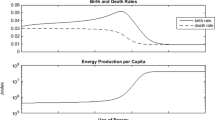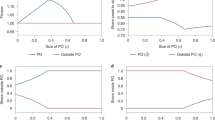Abstract
In this work, we are studying the dynamics of wealth inequality in a simulated primitive economy of producer agents. These agents represent families that live, produce and move in an environment that can be unstable. The families have different technological abilities and can decide differently about sharing produced food with others – i.e., whether to share through public stores and how much – or keeping it all for themselves and become wealthier. We show through agent-based modelling that in a competitive environment with cultural evolution, where agents that survive pass their behavioral profiles to their descendants, wealth inequality between agents follows an initially upward and then downward trend before stabilizing around its final value. This trend is reminiscent of swings identified by economists. We study it in cases of “shocks”, where after stabilization one of the parameters of the system is reinitialized (technology, environment, birth model and others). In all cases, the after-shock inequality movement shows the same overall trend but it is smaller in size, and this is true irrespective of the sharing outcome. We formulate the hypothesis that the size of the emerging maximum inequality is due to cultural reinitialization or innovation, where because of the shock the agents reinitialize their stances toward sharing, i.e. they innovate culturally. This hypothesis is supported by a series of experiments with varying degrees of cultural innovation as well as by an experiment with generalized cultural evolution. The global conclusion is that it is the cognitive/cultural lever of the economic relations, here the disposition toward sharing, that is responsible for the type and breadth of inequality that emerges.
Access this chapter
Tax calculation will be finalised at checkout
Purchases are for personal use only
Similar content being viewed by others
Notes
- 1.
Reverend Thomas Malthus (1766–1834) claimed that “the increase of population is necessarily limited by subsistence”, i.e., when population grows faster than the increase of food production then the population will arrive at a plateau where famine, wars and diseases will prevail and where the population size is the maximum allowed by the actual production rates. His suggestion was to use higher production rates for increasing standards of living rather than letting the population grow unconstrained.
- 2.
The number of runs was set empirically to ensure that the resulting standard deviations of all experiment series are very low compared to averages. This way, when comparing inequality measures, that are normalized by construction, we can judge significance in a quick, ad hoc manner. For example, for the second pair of lines of Table 3, the averages of 0.792 and 0.545 for Ineq(max) have a stdv of 0.041 and 0.061, respectively, therefore they are significantly different.
References
Gurven, M.: To give and to give not: the behavioral ecology of human food transfers. Behav. Brain Sci. 27(4), 543–583 (2004)
Kaplan, H., Gurven, M.: The natural history of human food sharing and cooperation: a review and a new multi-individual approach to the negotiation of norms. In: Gintis, H., Bowles, S., Boyd, R., Fehr, E. (eds.) Moral Sentiments and Material Interests, The Foundations of Cooperation in Economic Life, Chapt. 3, pp. 75–113 (2005)
Moore, J.: The evolution of reciprocal sharing. Ethology Sociobiol. 5(1), 5–14 (1984)
Jaeggi, A.V., Gurven, M.: Natural cooperators: food sharing in humans and other primates. Evol. Anthropol. 22(4), 186–195 (2013)
Nettle, D., Panchanathan, K., Shakti Rai, T., Fiske, A.P.: The evolution of giving, sharing and lotteries. Curr. Anthropol. 52(5), 747–756 (2011)
Boyd, R.: The evolution of reciprocity in sizable groups. J. Theor. Biol. 132(3), 337–356 (1988)
Winterhalder, B.: Social foraging and the behavioral ecology of intragroup resource transfers. Evol. Anthropol. 5(2), 46–57 (1996)
Kaplan, H.S., Schniter, E., Smith, V.L., Wilson, B.J.: Risk and the evolution of human exchange. Proc. R. Soc. Lond. B Biol. Sci. 279(1740), 2930–2935 (2012)
Kaplan, H.S., Schniter, E., Smith, V.L., Wilson, B.J.: Experimental tests of the tolerated theft and risk-reduction theories of resource exchange. Nat. Hum. Behav. 2(6), 383–388 (2018)
Tzafestas, E.: Relation between the public and the private and evolution of food sharing. In: Proceedings Social Simulation Conference, Milan (2022)
Hao, Y., Armbruster, D., Cronk, L., Aktipis, C.A.: Need-based transfers on a network: a model of risk-pooling in ecologically volatile environments. Evol. Hum. Behav. 36(4), 265–273 (2015)
Aktipis, C.A., Cronk, L., de Aguiar, R.: Risk-pooling and herd survival: an agent-based model of a Maasai gift-giving system. Hum. Ecol. 39(2), 131–140 (2011)
Scheffer, M., van Bavel, B., van de Leemput, I.A., van Nes, E.H.: Inequality in nature and society. Proc. Natl. Acad. Sci. 114(50), 13154–13157 (2017)
Scheidel, W.: The Great Leveler. Violence and the History of Inequality from the Stone Age to the Twenty-First Century. Princeton University Press, Princeton (2017)
Kohler, T.A., Smith, M.E.: Ten Thousand Years of Inequality: The Archaeology of Wealth Differences. University of Arizona Press, Tucson (2018)
Kondratieff, N.: The Long Waves in Economic Life (1925). (in Russian)
Kuznets, S.: Secular movements in production and prices: their nature and their bearing about cyclical fluctuations. Houghton Mifflin (1930)
Milanovic, B.: Global Inequality: A New Approach for the Age of Globalization. Harvard University Press, Cambridge (2016)
Midlarsky, M.I.: The Evolution of Inequality: War, State Survival, and Democracy in Comparative Perspective. Stanford University Press, Redwood City (1999)
Ames, K.M.: On the evolution of the human capacity for inequality and/or egalitarianism. In: Price, T.D., Feinman, G.M. (eds.) Pathways to Power. Fundamental Issues in Archaeology, pp. 15–44. Springer, New York (2010). https://doi.org/10.1007/978-1-4419-6300-0_2
Mattison, S.M., Smith, E.A., Shenk, M.K., Cochrane, E.E.: The evolution of inequality. Evol. Anthropol. 25(4), 184–199 (2016)
Starmans, C., Sheskin, M., Bloom, P.: Why people prefer unequal societies. Nat. Hum. Behav. 1(4), 1–7 (2017)
Baldwin, J.M.: A new factor in evolution. Am. Nat. 30, 441–451 (1896)
Axelrod, A.: The dissemination of culture: a model with local convergence and global polarization. J. Confl. Resolut. 41(2), 203–226 (1997)
Author information
Authors and Affiliations
Corresponding author
Editor information
Editors and Affiliations
Rights and permissions
Copyright information
© 2023 The Author(s), under exclusive license to Springer Nature Switzerland AG
About this paper
Cite this paper
Tzafestas, E. (2023). Cultural Innovation Triggers Inequality in a Sharing Economy. In: De Stefano, C., Fontanella, F., Vanneschi, L. (eds) Artificial Life and Evolutionary Computation. WIVACE 2022. Communications in Computer and Information Science, vol 1780. Springer, Cham. https://doi.org/10.1007/978-3-031-31183-3_13
Download citation
DOI: https://doi.org/10.1007/978-3-031-31183-3_13
Published:
Publisher Name: Springer, Cham
Print ISBN: 978-3-031-31182-6
Online ISBN: 978-3-031-31183-3
eBook Packages: Computer ScienceComputer Science (R0)




